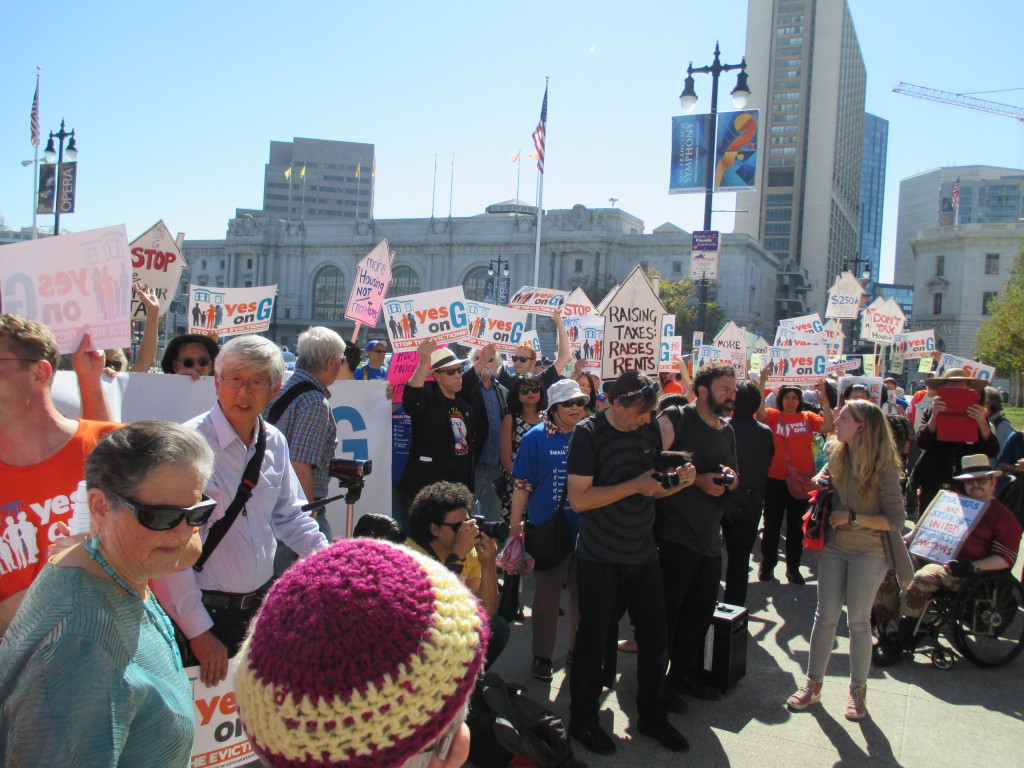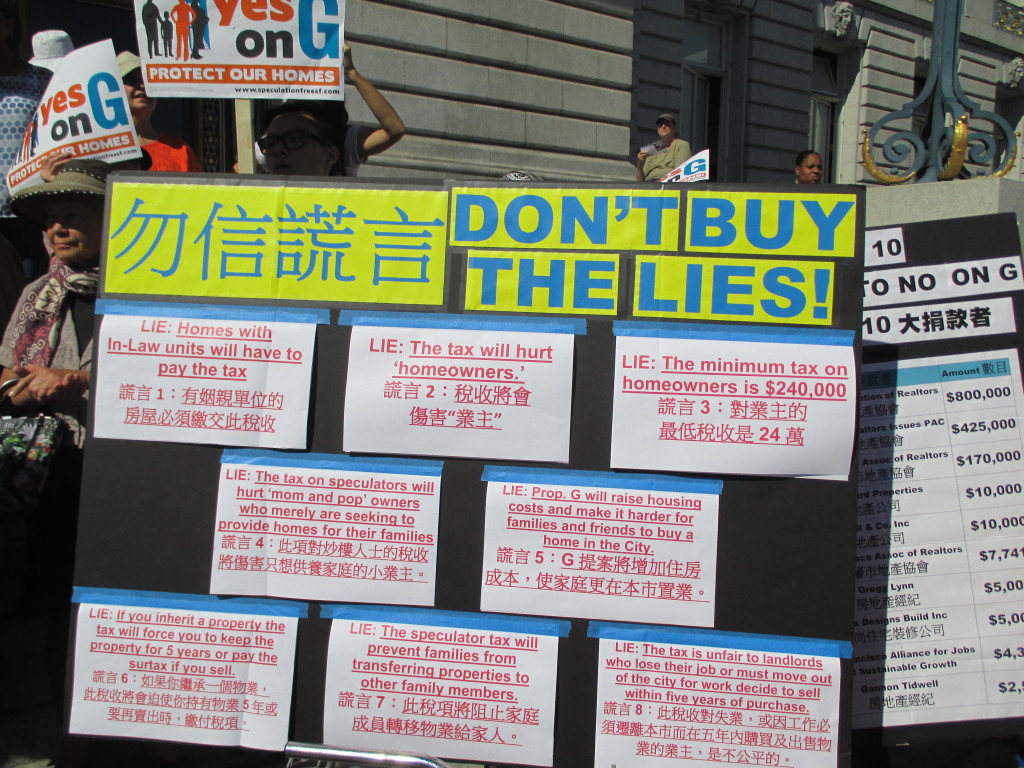
By Tim Redmond
OCTOBER 9, 2014 – On Monday morning, Oct. 6, in a federal courtroom, the oldest pro-corporate, libertarian legal organization in the nation was trying to shut down San Francisco’s tenant relocation law.
The Pacific Legal Foundation, funded in part by the Koch Brothers, has a long history of attacking progressive legislation and is particularly hostile to government regulations that limit private-property rights. It was founded by allies of Ronald Reagan, and once tried to halt the blockade of the Diablo Canyon nuclear power plant by suing protesters for $1 million.
Now the PLF has taken aim at a bill by Sup. David Campos that increases the relocation fees that landlords have to pay to tenants in an Ellis Act eviction.
A few minutes after the hearing ended, a group of pro-landlord folks who also denounced regulatory limitations on property rights invaded a Yes on Prop. G rally at City Hall, leading to some tense moments.
I know of no direct connection between the PLF and the Small Property Owners of SF, but the events of Oct. 6 both indicate an organized, well-funded attack on San Francisco’s ability to fight Ellis evictions.

Judge Charles Breyer is hearing the case against the Campos bill, and the hearing Monday was a preliminary discussion of the issues. The judge acknowledged that the city had an entirely rational basis for passing the law – city officials, he said, “did a thoughtful analysis of a crisis in housing” – and he added that there is no question that crisis exists.
The issue at hand, he said, is whether it’s legal under the US Constitution for the city to remedy the situation by forcing landlords to pay money to tenants – or whether that’s an illegal seizure of private property by the government.
The PLF is all about illegal seizure. The law firm has fought long and hard to keep public agencies from passing regulations that might decrease the economic value of private property. The law on this is really complicated, but PLF attorney J. David Breemer says the city ordinance amounts to “out and out confiscation.” His argument: Landlords have the right to do what they want with their property, including evicting tenants under the Ellis Act – and anything that puts a substantial financial burden on that process amounts to the government taking over private property.
In the hearing before Judge Breyer, Breemer repeatedly insisted that the city law is unconstitutional because the relocation payment “can be spent for anything, not just for a new place to live.”
The concept: A tenant living under rent control for 20 years who suddenly gets an Ellis Eviction will be paid enough money to cover the difference between the low existing rent and the rent he or she will have to pay on the open market – but in theory, that tenant could just take the money to Vegas and put it on 31 red. And, of course, accept homelessness as the consequence.
The deputy city attorney on the case, Christine Van Aken, had a pretty solid response: Everyone, she said, buys housing. It’s a human need. If the tenants who are evicted want to stay in San Francisco, they’ll have no choice but to spend that relocation money on housing. That’s the whole point of the law.
“If housing were a good that might not be purchased, this would be a different story,” she said.
Breemer kept up his thesis, that the law was “taking money from some and giving it to others.” This is the essence of the PLF philosophy: Government should be as limited as possible, and shouldn’t do much of anything (including taxation) that shifts wealth from the rich to the poor.
He tried over and over again to say that the Campos legislation was poorly drafted, that it was too much of a broad-brush approach and not narrowly tailored. On that point, Breyer disagreed:
“Could the legislation be drafted differently? Of course it could,” the judge said. “But that’s a political question, and I’m concerned about walking down that path.”
Throw it all out
The PLF is making the broadest possible attack on the law, saying that it’s invalid on its face – not just in some cases, but in every case. The right-wing law firm wants the entire ordinance thrown out.
The city attorney says that the law is valid because it establishes a clear nexus between the problem – too many evictions – and the solution, and because the solution is pretty closely tied to the problem.
“In an eviction, a landlord imposes and adverse impact on a tenant,” Van Aken said, “and that tenant is exposed in perpetuity. The landlord must mitigate that impact for just two years.”
And in fact, it’s a response to a very serious problem: “San Francisco policymakers,” the city’s trial brief notes, “have decided that this should not be a city only for the rich.”
Breemer tried to claim that a landlord is exposed by being forced to accept the economic impact of rent control in perpetuity, but Breyer said that’s irrelevant: “We already did it.” And there is a solid body of law stating that rent control is valid and defensible.
Breyer also noted that there’s a provision in the ordinance to protect landlords who have a financial hardship. Breemer argued that there is no means test for the tenant, but the judge asked “does that make any difference?”
Then Breemer complained that the money goes directly from the landlord to the tenant, and doesn’t guarantee any new affordable housing. Breyer: “Would you object if the money went to a city fund?”
Van Aken: “I don’t think if the money had to go to a city fund there would be any less of a challenge from the Pacific Legal Foundation.”
Breyer asked both parties to send in another set of briefs around the technical issues in two federal cases, Nollan v. California Coastal Commission and Dolan v. City of Tigard. I’m not a lawyer, of course, but as I understand it, those two cases address the question of whether a government program that has an impact on private property is related to the impact it imposes, and that the economic impact is roughly proportional.
Here’s the city attorney’s response:
Plaintiffs allege that the 2014 Mitigation Ordinance works an unconstitutional exaction: it imposes a condition on their right to evict tenants under the Ellis Act that is unrelated to the harms of eviction and that is not roughly proportional to the degree of those harms.
At bottom, that claim fails because landlords’ required mitigation payment is roughly proportional to the harm they impose on their tenants by evicting them from a rent-regulated unit and forcing them to seek new housing at market rates. But the Court need not even reach the merits, because Ninth Circuit has held that (1) a relocation payment to displaced tenants is not an exaction; (2) a Nollan/Dolan claim cannot be asserted as a facial challenge; and (3) the Nollan/Dolan test does not apply to legislatively imposed conditions.
This is what the next round of the lawsuit will hinge on.

Breemer held a press conference on the sidewalk outside the federal building after the hearing, and repeated the mantra that the relocation money was “no strings attached.” I asked: Suppose the money went directly to rent payment to a new landlord, would you still oppose it?”
Breemer: “I’m not going to address that.”
Of course not. The PLF opposes rent control in any form, and is trying to push its agenda onto the city.
Who hired the buses?
I rode my bike down to City Hall, where the Yes on G campaign was holding a rally to support the idea of an anti-speculation tax. A group called the Small Property Owners of San Francisco bused in people to try to shout down the tenant advocates.
It was very much an organized event: An email from Josephine Zhao, an organizer of the SPO, which I’ve obtained, notes that
Just got the word, the opposition is mounting an offense on Prop G, we must be there to counter. Please wear your blue shirt, and come to the side walk of City Hall East Entrance (Polk) on Monday, 10/6/2014 at 10:45am.
The No on G side didn’t just need to show up – there were Mercedes buses on hand to pick them up afterwards.
As it turned out, the Yes on G folks outnumbered the other side by about ten to one. The landlord side was loud at times, but not very effective – except that media accounts talked about two dueling rallies, instead of pointing out the message the Yes on G was trying to send.

Most of the people from the SPO side – at least, the ones I talked to – seemed to be single-family homeowners, who would not be affected in any way by Prop. G. They seemed to be arguing that if this passes, they could be next.
I called Zhao to talk about all of this, and she said that “the way things are going, the city is pushing small property owners to the point where they can’t survive.” I asked how that could be happening, and she said that single-family houses with in-laws would be covered by the anti-speculation tax. Not a whole lot of people are buying and selling those units in a short period of time.
She insisted that “we are not flippers, we own for a long time.” So I repeated: How does this possibly impact you? Her only answer was that people who inherited rental property and sold it quickly might have to pay the tax. That seems like a fairly small universe.
At any rate, I was curious: Who paid for the buses and the T-shirts?

If the SPO is running its own campaign against Prop. G, then by law it’s an independent expenditure committee that has to file paperwork with the Ethics Commission and list its donors and expenses. If it’s part of the official No on G campaign, that that operation has to disclose where the money is coming from.
Eric Jaye, who is managing the No on G campaign, told me that the data he has at this point “shows no money to them and no money from them.” In other words, the No on G campaign, which has duly filed its contribution and expense reports, didn’t pay for the buses.
I asked Zhao who did and she said: “You are smart. You figure it out.”
The way I would figure it out, of course, is to ask her. “We have done or will do the proper paperwork,” she said.
But as of today, there is no filing at the Ethics Commission showing an IE from the Small Property Owners on Prop. G.






